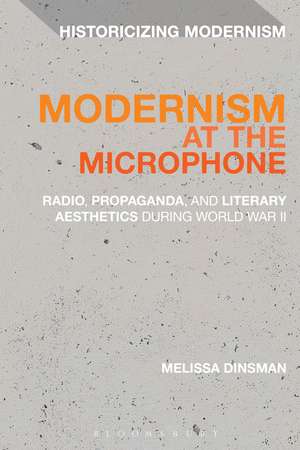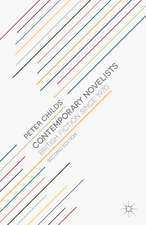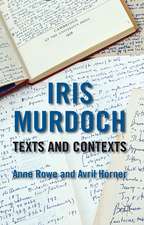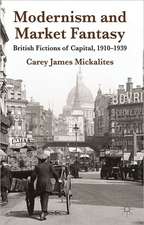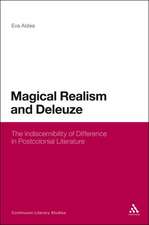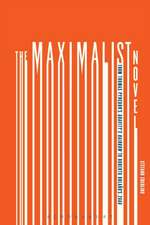Modernism at the Microphone: Radio, Propaganda, and Literary Aesthetics During World War II: Historicizing Modernism
Autor Dr Melissa Dinsmanen Limba Engleză Paperback – 22 mar 2017
| Toate formatele și edițiile | Preț | Express |
|---|---|---|
| Paperback (1) | 257.68 lei 6-8 săpt. | |
| Bloomsbury Publishing – 22 mar 2017 | 257.68 lei 6-8 săpt. | |
| Hardback (1) | 715.73 lei 6-8 săpt. | |
| Bloomsbury Publishing – 23 sep 2015 | 715.73 lei 6-8 săpt. |
Din seria Historicizing Modernism
- 14%
 Preț: 540.31 lei
Preț: 540.31 lei - 30%
 Preț: 600.06 lei
Preț: 600.06 lei - 30%
 Preț: 602.11 lei
Preț: 602.11 lei -
 Preț: 447.42 lei
Preț: 447.42 lei - 30%
 Preț: 715.42 lei
Preț: 715.42 lei - 30%
 Preț: 509.93 lei
Preț: 509.93 lei - 13%
 Preț: 237.84 lei
Preț: 237.84 lei - 22%
 Preț: 259.07 lei
Preț: 259.07 lei - 13%
 Preț: 255.76 lei
Preț: 255.76 lei - 22%
 Preț: 777.06 lei
Preț: 777.06 lei - 13%
 Preț: 257.97 lei
Preț: 257.97 lei - 13%
 Preț: 256.12 lei
Preț: 256.12 lei - 22%
 Preț: 258.59 lei
Preț: 258.59 lei - 13%
 Preț: 256.29 lei
Preț: 256.29 lei - 13%
 Preț: 258.42 lei
Preț: 258.42 lei - 30%
 Preț: 716.56 lei
Preț: 716.56 lei - 22%
 Preț: 232.34 lei
Preț: 232.34 lei - 22%
 Preț: 257.32 lei
Preț: 257.32 lei - 13%
 Preț: 228.85 lei
Preț: 228.85 lei - 30%
 Preț: 657.22 lei
Preț: 657.22 lei -
 Preț: 259.07 lei
Preț: 259.07 lei - 13%
 Preț: 258.42 lei
Preț: 258.42 lei - 22%
 Preț: 258.42 lei
Preț: 258.42 lei - 13%
 Preț: 257.03 lei
Preț: 257.03 lei - 30%
 Preț: 717.05 lei
Preț: 717.05 lei - 13%
 Preț: 256.20 lei
Preț: 256.20 lei - 22%
 Preț: 259.25 lei
Preț: 259.25 lei - 30%
 Preț: 773.81 lei
Preț: 773.81 lei -
 Preț: 237.75 lei
Preț: 237.75 lei - 23%
 Preț: 236.27 lei
Preț: 236.27 lei - 13%
 Preț: 257.12 lei
Preț: 257.12 lei
Preț: 257.68 lei
Preț vechi: 331.29 lei
-22% Nou
Puncte Express: 387
Preț estimativ în valută:
49.31€ • 53.55$ • 41.42£
49.31€ • 53.55$ • 41.42£
Carte tipărită la comandă
Livrare economică 22 aprilie-06 mai
Preluare comenzi: 021 569.72.76
Specificații
ISBN-13: 9781350028456
ISBN-10: 1350028452
Pagini: 264
Dimensiuni: 156 x 234 x 20 mm
Greutate: 0.37 kg
Ediția:NIPPOD
Editura: Bloomsbury Publishing
Colecția Bloomsbury Academic
Seria Historicizing Modernism
Locul publicării:London, United Kingdom
ISBN-10: 1350028452
Pagini: 264
Dimensiuni: 156 x 234 x 20 mm
Greutate: 0.37 kg
Ediția:NIPPOD
Editura: Bloomsbury Publishing
Colecția Bloomsbury Academic
Seria Historicizing Modernism
Locul publicării:London, United Kingdom
Caracteristici
Explores the broadcasting work of writers such as Bertolt Brecht, Virginia Woolf, George Orwell, Orson Welles, Dorothy L. Sayers and Ernest Hemingway
Notă biografică
Melissa Dinsman is a CLIR Postdoctoral Fellow in Data Curation for Visual Studies, University of Notre Dame, USA.
Cuprins
1. Introduction: The Voices of War2. War on the Air: Adorno's and Welles's Radio Writings3. Militarizing the Messiah: Sayers's and Eliot's Christian Rebranding of Wartime Britain4. MacNeice's "Transatlantic Call": Modernist Complexity in a Mass Aural Medium5. Orwell and his BBC "Voice": Propaganda, Literature, and New Networks6. Clogged Communication: The Broadcasting and Epistolary Networks of MacLeish and Pound7. Haunted Network: Mann's Los Angeles Broadcasts to Germany8. CodaBibliographyIndex
Recenzii
Dinsman's volume is refreshing in its treatment of radio as a medium for which national borders are permeable, if persistent, barriers to cultural exchange. By connecting the wartime output of writers from Germany (Thomas Mann, Theodor Adorno, Bertolt Brecht, and Walter Benjamin), the United States (Archibald MacLeish, Ezra Pound, and Orson Welles), Britain (Dorothy Sayers, Louis MacNeice, and George Orwell), and the British Empire (Mulk Raj Anand), Dinsman captures the global extent of wartime broadcasting and its ability to forge networks for both quasi-military aggression and cultural connection . By addressing a broad swath of the figures who made important contributions to wartime radio, Dinsman makes a significant contribution to the fields of wartime literary and cultural study.
[An] account of the various ways in which many of Modernism's greatest names interacted with the radio ... The most compelling sections delineate the fruitful interactions of unlikely collaborators.
[This book] is thought-provoking and informative. It adds to a dynamic and engaging field with readings of a variety of authors both well known and less studied.
An informative overview of radio in relation to key modernist figures and to modernist aesthetics more generally. It conveys both contemporary reservations regarding radio as a form of mass communication and some of the ways in which it helped to inspire modernist innovation.
[An] account of the various ways in which many of Modernism's greatest names interacted with the radio ... The most compelling sections delineate the fruitful interactions of unlikely collaborators.
[This book] is thought-provoking and informative. It adds to a dynamic and engaging field with readings of a variety of authors both well known and less studied.
An informative overview of radio in relation to key modernist figures and to modernist aesthetics more generally. It conveys both contemporary reservations regarding radio as a form of mass communication and some of the ways in which it helped to inspire modernist innovation.
